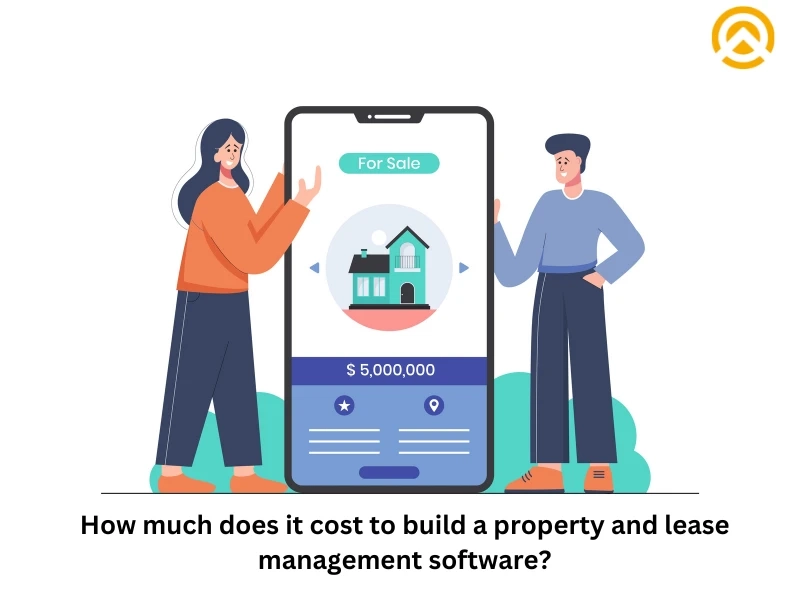Real estate businesses are increasingly adopting technology to streamline their operations and boost efficiency. One such technology solution is property and lease management software, which can be developed through real estate app development. This software automates various property management tasks, including lease tracking, rent collection, maintenance management, and financial reporting.
If you're considering building a property and lease management software, one of the critical questions you might have is: how much does it cost? In this blog, we'll explore the factors that affect property management software development costs, the types of property management systems, and why your business needs one.
Understanding the Property Management Software Development Cost
The cost of developing a property management software with the help of a real estate app development company typically ranges from $40,000 to $250,000, and varies based on factors such as the location of the development agency, the software's UI/UX design, the underlying tech stack, and the feature list. The complexity of the software is a major factor that impacts its cost - more complex software with extensive features is likely to cost more than simpler software with fewer features and a simpler user interface.
To give an idea of estimated development costs for different complexity types is as follows:
Simple property management software: $40,000 to $60,000, with a development time of 3 to 6 months.Moderately complex property management software: $60,000 to $100,000, with a development time of 6 to 8 months.Highly complex property management software: $100,000 to $250,000, with a development time of 9 or more months.In terms of determining the pricing for a property management software, there is a formula that takes into account the total development hours required for tasks such as wireframing, design, coding, quality assurance, and maintenance, as well as the hourly rate of the development agency hired. It's recommended to work with a dedicated software development company with experience in building similar software to get a more accurate estimate for development costs.
Property management software development cost = Total development hours x Hourly rate of development
Property Management Software Features
Here are some of the critical features that a property management software should have:
Lease Management: This feature helps property managers manage leases, including lease creation, renewal, and termination.Rent Collection: The software should have a feature that enables rent collection and tracks rent payments.Maintenance Management: This feature helps property managers manage property maintenance tasks, including repair requests and scheduling maintenance appointments.Tenant Portal: The software should have a tenant portal that allows tenants to view lease details, pay rent, and raise maintenance requests.Financial Reporting: The software should have a feature that generates financial reports, including rent roll reports, profit and loss statements, and balance sheets.Types of Property Management Systems
Residential Property Management: On-premises property management systems are commonly used for residential properties such as apartment buildings. This is because on-premises systems offer more customization options and can handle a larger volume of units. For example, Rent Manager is an on-premises system that allows property managers to handle accounting, lease management, maintenance requests, and tenant screening for residential properties.Hotel Property Management: Cloud-based property management systems are commonly used for hotels, as they allow staff to access information and make reservations from any location. For example, Cloudbeds is a cloud-based system that offers features such as online booking, room management, and guest communication for hotels and vacation rentals.Commercial Property Management: Integrated property management systems are commonly used for commercial properties, as they can handle multiple types of data such as lease agreements, accounting, and maintenance requests. For example, AppFolio is an integrated system that offers features such as tenant screening, lease management, and rent collection for commercial properties such as office buildings and retail spaces.Mobile Property Management: Mobile property management systems are useful for properties that require on-the-go management, such as vacation rentals or student housing. For example, Guesty is a mobile system that allows property managers to communicate with guests, handle reservations, and track maintenance requests all from their mobile device.Why Does Your Business Need Property and Lease Management Software?
Here are some reasons why your business needs property and lease management software:
Improved Efficiency: Property management software automates various tasks, reducing the time and effort required to manage properties.Streamlined Operations: The software helps property managers streamline their operations by centralizing data, automating tasks, and improving communication.Better Tenant Management: The software enables property managers to provide better tenant management by offering tenant portals for rent payments and maintenance requests.Improved Financial Reporting: The software generates financial reports that help property managers make informed decisions about their properties' financial performance.Scalability: Property management software is scalable and can accommodate the growth of your business.Competitive Advantage: Adopting property management software gives your business a competitive advantage by improving efficiency and customer satisfaction.Read more: The Future of Real Estate Broker Rental Apps: Trends to Watch in 2023
Conclusion
In conclusion, building a property and lease management software can be a significant investment, with costs ranging from $40,000 to $250,000 depending on the complexity of the software. Several factors can impact the overall real estate mobile app development budget, such as location, UI/UX design, tech stack, and feature list.
To get an exact estimate on app development budget, it is recommended to contact a real estate mobile app development company whose real estate mobile app developer has the expertise in building similar software. However, investing in a property management software can result in long-term benefits such as increased efficiency, streamlined workflows, and improved customer experience.


